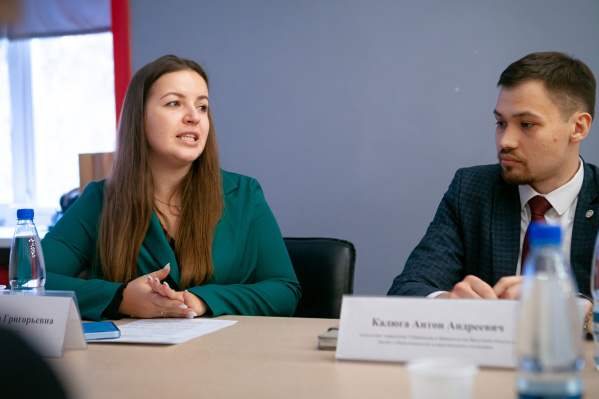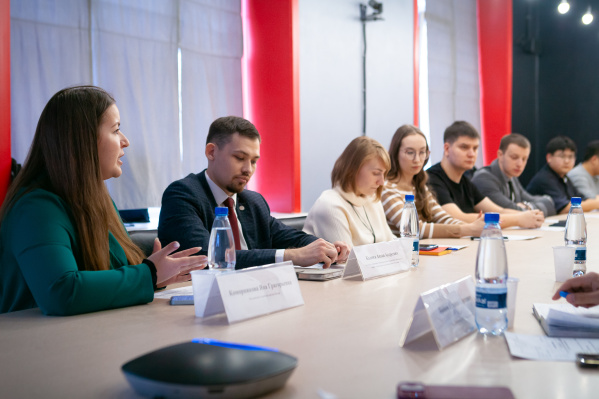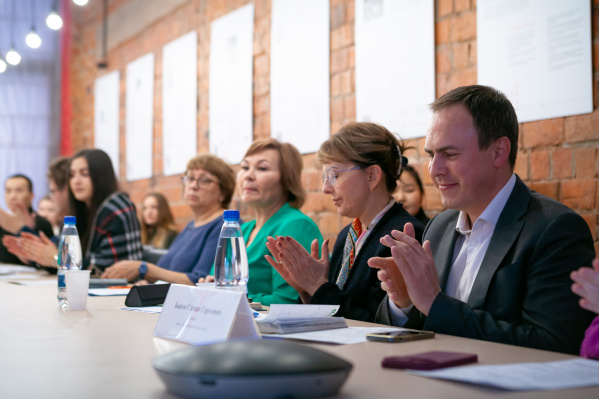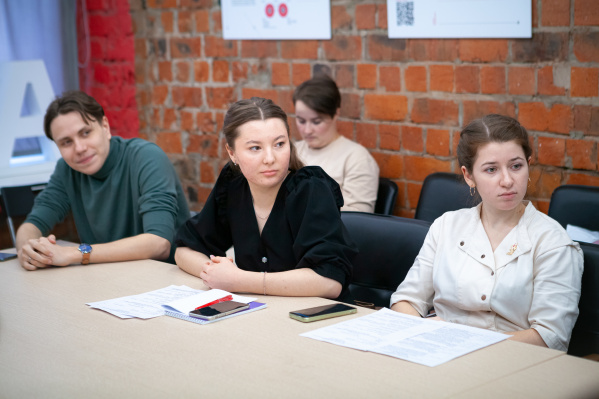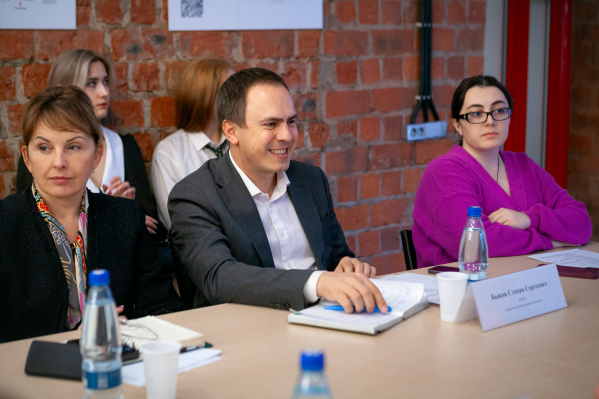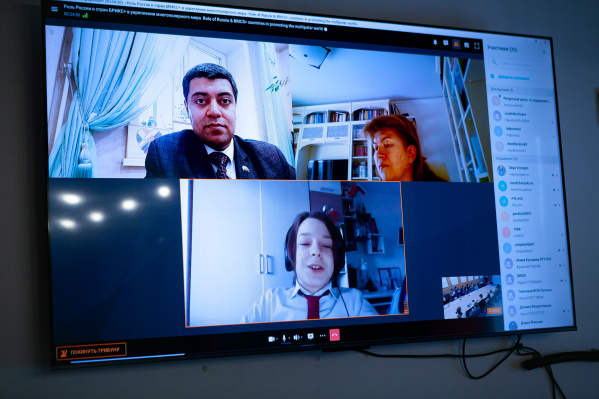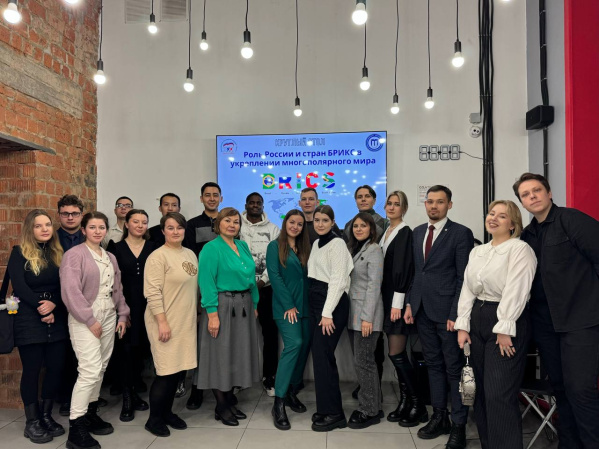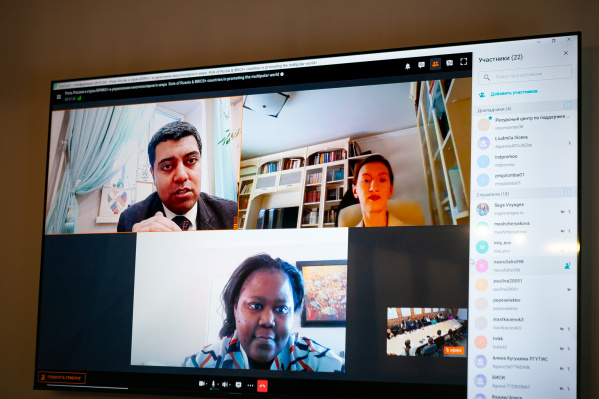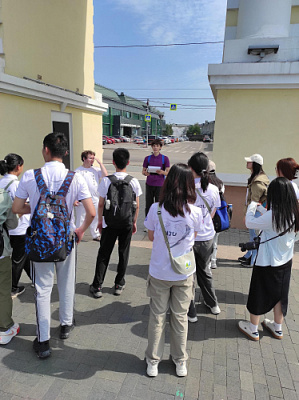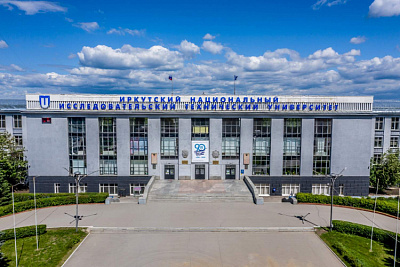The Role of Russia and BRICS+ Countries in Strengthening the Multipolar World was Discussed at INRTU
On January 15, INRTU hosted a round table on "The Role of Russia and BRICS+ Countries in Strengthening the Multipolar World". Speakers exchanged views on the economy, IT sphere and tourism in the framework of expanding international contacts.
The event was organized by the Irkutsk Regional Branch of the Youth Assembly of Peoples of Russia (YAPR) - WE ARE RUSSIANS and the Coordination Center for Formation of Active Citizenship of Young People, Prevention of Interethnic and Interreligious Conflicts, Countering the Ideology of Terrorism and Prevention of Extremism.
The purpose of the discussion platform is to develop friendly relations between representatives of Russia's regions and foreign citizens from BRICS+ countries, as well as to promote traditional Russian spiritual and moral values.
Participants in the event included students and specialists from 15 countries connected via videoconferencing. Russia was represented by speakers from Irkutsk, Abakan, Norilsk, Tambov, Kislovodsk, Moscow, Sevastopol, Lugansk, St. Petersburg, and Novy Urengoy. Experts from India, Belarus, China, Malaysia, South Africa, Algeria, Nigeria, Ivory Coast, Zambia, Myanmar, Nepal, Cameroon, Somalia and Venezuela actively participated in the dialogue.
Opening the meeting, Yana Komornikova, Chairperson of WE ARE RUSSIANS Irkutsk Regional Branch YAPR, reminded that BRICS is an intergovernmental association established in 2009. The current agenda requires representatives of the public, youth and specialists in international relations to make constructive decisions contributing to the strengthening of a multipolar world.

"Initially, BRICS included Russia, Brazil, India, China and South Africa. The year 2024 was positive for the entire Association. First, Russia assumed the BRICS chairmanship. Second, Iran, Saudi Arabia, Egypt, United Arab Emirates, Ethiopia and Egypt became members of the organization.
The expansion of the geographical borders leading to the BRICS+ format is an opportunity to develop friendly relations, harmonize cultural and economic cooperation," said Yana Komornikova.
Anton Kalyuga, Advisor to the Department of Ethnic and Religious Relations of the Governor and Government of the Irkutsk Region, Department of Public Relations and National Relations, supported the colleague.

Sethi Rishabh, President of the Center for the Promotion of International Initiatives (India), expressed confidence that 2024 will bring high results for BRICS+ members:
"The time of geopolitical changes will unite us, we will help each other, the member countries of the organization will contribute to their development."
Stepan Bykov, Vice-Rector for International Affairs of INRTU, emphasized that the university pays special attention to work with international students.

"INRTU has students from 56 countries, and every tenth student comes from abroad. We are strengthening cooperation with representatives of developing countries. For this reason, the Baikal School of BRICS was opened in the structure of the university, which welcomed the first students in 2018. The results of the work of the "young" unit showed that the development of cross-cultural dialogue continues to be a relevant issue," - said Stepan Bykov.
Director of BS BRICS Anna Kireenko added that the School’s main mission is to raise the prestige of Russian education in the global market. Today students from China, India and African countries study at INRTU in English. This is in line with the concept of the Global South, which is becoming increasingly popular.
Dmitry Ishchenko, a third-year student of the History Department of the Irkutsk State University, is the author of the report "Economic Interaction of the Irkutsk Region with China and India (in the "Turning East" context)". Dmitry noted that against the background of large-scale geopolitical changes in the world, interest in BRICS is growing. The achievements of the association in the economic, cultural and military spheres show that the member states are capable of shaping the international agenda. The innovative format of interaction between the BRICS member states is based on partnership, the main value of which is respect for each other's interests and common aspiration for comprehensive development. This approach is attracting more and more countries. For example, the XV Summit held in August 2023 in Johannesburg (South Africa), brought together 67 countries.
Russia claims the right to participate in the development of the Asia-Pacific region (APR). Showing loyalty to the countries of the East, Russia is developing trade relations with India and China. In 2011-2021, Russia has boosted exports to both countries. Domestic enterprises supplied aircraft components to India, and chemical and timber industry products to China. In order to develop the Siberian macro-region, special measures should be developed to attract companies from India and China. Dmitry Ishchenko believes that public-private partnership can play a special role.
Darya Kharitonova, a student of the Baikal State University, spoke about the prospects of creating a common currency in the BRICS countries. According to the speaker, it will make it possible to conduct more foreign economic transactions and increase trade turnover. At the same time, the differences in financial indicators between the countries should be taken into account. Using the currency of one of the BRICS countries may have negative consequences. Following this topic, Vladimir Lazereg, a student of the Irkutsk State University, spoke about the economic potential of states in modern times.
The program of the event included reports prepared by speakers from the Russian Academy of National Economy and Public Administration, the Agency for Strategic Initiatives and the Assembly of Peoples of Eurasia, the public organization "Business Russia", the Association of Patriotic Tourism, the autonomous nonprofit organization "Federation for the Development of Hospitality and Tourism "Soul of the People", the Belarusian Institute for Strategic Research (BISR). In addition, there were reports in English on youth leadership, climate issues, and others.
Photo by Arseniy Chekmarev and Valentina Oshchepkova
